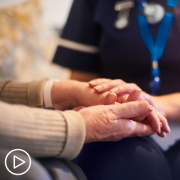MPN Patient Q&A: How Did Your MPN Diagnosis Impact Your Life?
MPN Patient Q&A: How Did Your MPN Diagnosis Impact Your Life? from Patient Empowerment Network on Vimeo.
For a myeloproliferative neoplasm (MPN) patient, how can diagnosis impact your life? Watch as MPN patient Nona shares her experience as a working mom, and Dr. Nicole Rochester shares her perspective about self-care.
This program provides one patient’s perspective. Please talk to your own doctor to make healthcare decisions that are right for you.
See More from Best MPN Care No Matter Where You Live
Related Resources:

|

|
Transcript:
Dr. Nicole Rochester:
All right, our next question comes from Edna. And Edna says that in your…you stated that you were diagnosed at 41 and that you are a busy mom and that you were working, and she wants to know, “How did you share this diagnosis with your children, and how did it impact your work in your career?”
Nona Baker:
It’s a very interesting question, and I think my children, because I had sort of my mom’s painful feet, and I have packets of mushy peas that used to be put on my feet because they were painful because of the obviously thick blood, and my younger son has done a lot of fundraising for MPN Voice. And he talked about how as an 8-year-old, he’d grown up with me having these symptoms that I haven’t done much about, and I know I’ve always taken the view for me, and this is only for me, that I don’t let my MPN define who I am. You know, I think it’s part of my life. It isn’t my life, because my fear would be after that initial anxiety and fear that if I allowed it to take over my life, it would actually really impact my younger…my young children…in terms of my work, I only work part-time. You know, the other thing is, yes, I got a lot of fatigue, but I think what I’ve learned over the years is to put your hands up and say, “You know, I’ve hit a wall,” whereas I just take five minutes.
Nona Baker:
Just take that time. Whereas sometimes it’s difficult when you’re a mom with young children, and I think now, people tend to explain it a bit to their young children, when mom’s tired, it’s not because it’s anything you’ve done it, because I remember patients describing it to have children is…it’s like a car when the oil in the car gets too thick, the car slows down and sometimes the car needs to stop, and she equated her blood as the oil in the car that sometimes it just slows down and then has to stop gets a bit of refueling, I thought that was a good definition for young children.
Dr. Nicole Rochester:
I love that, I love that, and I’m a pediatrician by training, so I love putting things in clear terms for kids, and I think that’s really important to just make it simple for them. I also really like what you said, Nona about the self-care part, I think that can be really difficult sometimes for even women who may not have chronic diseases, but certainly for women and moms who have chronic diseases and feeling that feeling guilty when they take time for themselves, even if it’s in the context of their illness. And so, needing to rest and explaining that and normalizing that mom needs to take a nap, I think is incredible, and I love that your son is involved in the advocacy work that you do for MPNs.












